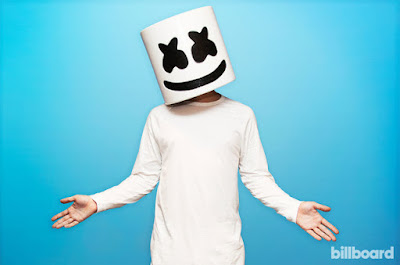How Marshmello Became A $44 Million DJ
“It was cracked,” the headpiece’s owner, incognito DJ-producer Marshmello, told Forbes in a rare interview.
Nowadays he can afford to fly private. Marshmello earned $44 million over the past two years, thanks to six-figure nightly fees and crossover hits like “Happier” (with Bastille) and “Wolves” (with Selena Gomez). Puffed up by his series “Cooking With Marshmello,” his YouTube channel is now the 50th largest on the planet—behind Bruno Mars and ahead of Maroon 5—averaging 250 million views and 1.4 million new subscribers every month.
“What sets the world’s greatest DJs apart is that they are also great producers and songwriters, creating songs that transcend genre and appeal to a global pop audience,” says Robb McDaniels, CEO of Beatport, the electronic music hub. “Marshmello is one of the select few who have defined this generation.”
Success has allowed Marshmello to upgrade to a $55,000 helmet that has an internal air-conditioning system and programmable LED lights and weighs just eight pounds. More important, the headgear has turned into a transcendent symbol that has placed Marshmello among the world’s five highest-earning DJs even as he refuses to obey the music industry’s rules: He still hasn’t signed a major label record deal, much less shown his face in public.
“For us it was, how do you create a brand that is accessible to everybody, that everyone can be and relate to?” says Marshmello’s manager, Moe Shalizi, who lands on our new 30 Under 30 list; his client graces the cover. “The concept we had in mind with Mello was, How do you create a universal character?”
The story begins in 2015, when the young DJ and Shalizi—who met Marshmello while he was still experimenting with different sounds and identities online—picked the name Marshmello in a nod to his music’s mellow feel (during the 30 Under 30 vetting process last year, Forbes confirmed his age, 26, and full name, Chris Comstock).
To this day, the DJ has never publicly acknowledged any biographical information. And when Marshmello made his musical debut, releasing a free download every few days for three weeks via Soundcloud, the mystery helped supercharge his popularity. Electronic music fans on Reddit became obsessed with discovering his identity, as did some of the genre’s superstars—like Skrillex, the earliest high-profile booster of his music.
“I need to know who Marshmello is,” Shalizi remembers Skrillex demanding. “I'm going through some stuff in my life and I really need to know who he is because the music is helping me.”
But Shalizi’s client wanted to remain anonymous and didn’t seem particularly interested in fame. Even after he started texting Skrillex, Marshmello was so shy that he initially refused to contact his hero about an in-person meeting. “Skrillex [is] the guy who I've been looking up to ever since I started doing electronic music,” Marshmello recalls telling Shalizi as they cruised through Los Angeles. “I'm not just going to call him.” Shalizi stopped the car. “I’m not going to go until you call him,” the manager replied.
Marshmello relented—and found a surprise on the other end of the line: Katie Couric, who happened to be interviewing Skrillex for Yahoo on camera. (“It’s Chris,” she noted as the caller ID flashed onscreen. “Oh, Marshmello,” Skrillex replied). A week later the video interview went public—and Marshmello’s growing legion of fans got their first clue to his identity. Internet conspiracy theorists posited that he was actually a rotating cast of famous DJs including Skrillex, Martin Garrix and Tiësto (the latter trolled electronic music enthusiasts by showing up to a gig in a Marshmello mask).
Shalizi insists Marshmello will earn around $50 million in 2019, which would put him on par with this year’s top earner, Calvin Harris.
The buzz only helped drive Marshmello’s earning power: In late 2015, he took home $30,000 for his first major gig, a Halloween show in New York. Then Shalizi planned a tour, focusing on small clubs that would sell out and drive demand. Marshmello earned scores of new fans—and grew his social media presence (he now boasts 7 million followers between Twitter and Facebook)—by spending hours posing for selfies after shows
Marshmello got a boost from Coachella in 2016 even though he didn’t play the festival. Shalizi rented a nearby highway billboard and splashed an image of the DJ across it. Then he hired two bodyguards and a photographer to follow Marshmello around the festival, where he posed with celebrities like Zedd and DJ Khaled. “A year in, we already had over a million followers on Instagram,” says Shalizi (today’s count: 13.7 million). Marshmello returned to Coachella in 2017 and headlined the Sahara Tent, the festival's premier electronic stage.
His 2016 breakout hit, “Alone,” racked up 1 billion views on YouTube; his first album, Joytime (2016), reached No. 5 on the U.S. Dance charts. Major labels came calling with multimillion-dollar record deals, but Marshmello and Shalizi weren’t convinced that giving up their independence was worth it. “They wanted to sign us just to sign us,” says the DJ.
Marshmello stayed independent and struck deals on a song-by-song basis, making it easy for him to collaborate with artists on different labels. Keeping control of his copyrights enabled him to further goose his social presence by giving influencers his music to use in their videos. In turn, they would tag him, thereby introducing him to their followers. This was part of what Shalizi likes to call “infinite algorithm” of social media.
To be sure, Marshmello isn’t the first DJ to cash in on a mysterious image—he follows in the helmet-steps of electronic acts like Deadmau5 and Daft Punk—but his earnings total over the past year ranks as the best annual haul for an incognito DJ ever measured by Forbes.
“It’s less about the masks and more about the actual talent,” Beatport’s McDaniels says of Marshmello. “He’s certainly got a long career in music ahead of him.”
Sure enough, his latest album, Joytime II, claimed the top spot on the dance charts this year. Shalizi insists Marshmello will earn around $50 million in 2019, which would put him on par with this year’s top earner, Calvin Harris. The young manager entertains even wilder dreams. “We always talk about taking Marshmello public one day,” says Shalizi, referring to turning the DJ’s business into a publicly traded company. “He can do anything.”
“What sets the world’s greatest DJs apart is that they are also great producers and songwriters, creating songs that transcend genre and appeal to a global pop audience,” says Robb McDaniels.
Though that may be a bit far-fetched, Marshmello has certainly built a DJ business with room to grow. Like Marvel’s stable of superheroes, his image is one onto which anyone anywhere can project their hopes and dreams—Shalizi says his biggest markets range from Brazil to Singapore. Marshmello connects by nodding to local favorites, playing Bollywood theme songs at New Delhi gigs or posting Indonesian fried rice recipes on “Cooking With Marshmello” for his Jakarta fans.
And, in theory, Marshmello is infinitely scalable. Imagine an army of confectionary clones fanning out across the globe, paying Marshmello a cut of their nightly fees. Just don’t bet on that last part happening.
“Sometimes we talk to people and they’re surprised we aren’t doing that,” explains Marshmello. “And I’m like, That’s not why I did this.”





Comments